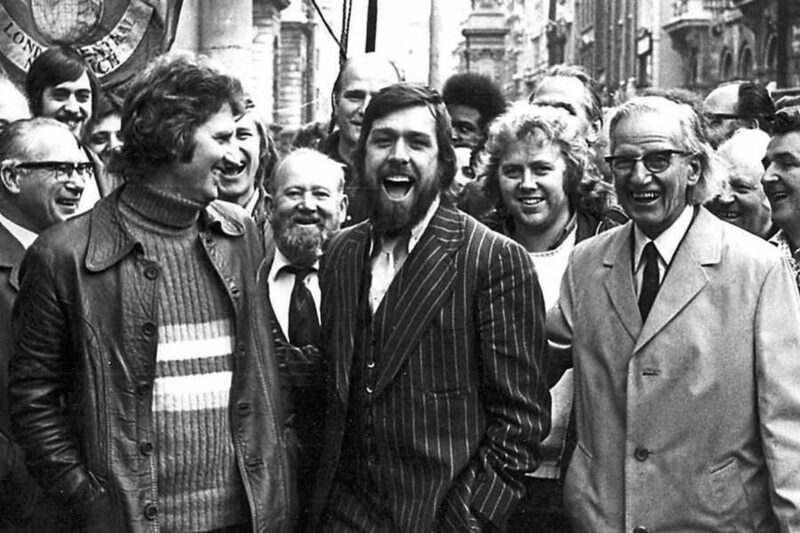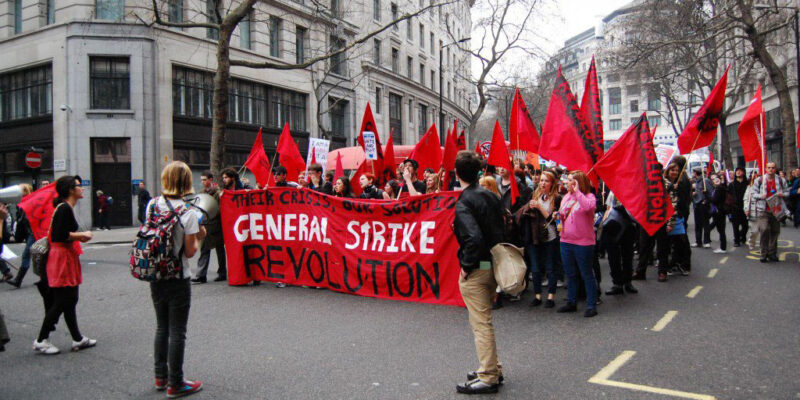History
The British General Strike of 1926 – Part Two
In Workers Power 367 we saw how the Communist Part of Great Britain (CPGB) initiated the powerful rank and file Minority Movement, but became ever more uncritical supporters of the union leaders when the British TUC formed the Anglo-Russian committee with the Russian trade unions. Dave Stockton looks at what this meant for the 1926 […]
Fighting for the right to strike
Jeremy Dewar recounts how the anti-union laws shackled the unions and calls for defiance
1926: How the TUC betrayed the General Strike
The 1926 General Strike is rich in lessons for today. Dave Stockton looks at how the ruling class prepared for it while the unions leaders did not. In the mid-1920s the Miners Federation of Great Britain (MFGB) had almost a million members, and was the militant core of the working class movement. Coal was still […]
Pentonville Five: when dockers fought the law and won
Forty years ago, four London dockers were arrested and held in north London’s Pentonville Prison. The next morning a fifth was arrested outside while protesting at their arrest. Yet within five days the Pentonville Five were freed by a wave of unofficial action and the threat of a general strike. Dave Stockton looks at the […]
The Great Unrest: How militant miners created a movement of the rank and file
In part two of this commemorative article, Dave Stockton looks at how the miners built the first rank and file trade union movement in the UK. In Part one of this article, we looked at the work of Tom Mann in bringing many of the ideas of transatlantic and continental revolutionary trade unionism (syndicalism) to […]
The Great Unrest: Organising the Rank and File 1910-1914
In this timely commemorative article, Dave Stockton looks at the lessons from the great working class struggles before World War One. Part two will follow next month. We have just marked the 100th anniversary of the miners’ strike of February-April 1912. This was the first national strike by a section of workers who in […]
The great building workers’ strike of 1972
The building workers' strike holds lessons on the dangers of Broad Leftism for union activists today
The Jarrow March – for jobs and dignity
The Socialist Party organised Jarrow March ended in London in early November, inspired by the 1936 Jarrow crusade, Joy Macready and Dave Stockton look at the historical lessons and what can be learnt today
Ten years since 9/11
Rix Bragg reflects on the legacy of 9/11 ten years on. For those who lived through the events of September the 11th 2001, the great majority will find them hard to forget. As two hijacked commercial airliners were flown into the Twin Towers, one into the Pentagon, and another brought down by passengers over Shanksville, […]
Twenty years since the death of the USSR
Dave Stockton looks back at the aborted coup in the USSR and the counter-coup by Boris Yeltsin
1848 When revolution swept Europe
By Simon Hardy The year 2011 is a year of revolution. Uprisings sweep across the Middle East as rebellion against kings and dictators move from one country to another. And in Europe the crisis is spreading upheaval from Greece to Spain and beyond. This article looks at another “mad year” and ask what lessons the […]
May 1926: when workers stopped the country
AT A TIME when we are facing a major offensive on workers’ gains and the union movement, the 85th anniversary of the 1926 general strike is a good opportunity to review its lessons for us today. Dave Stockton explains why
British imperialism’s bloody history in the Middle East
UK Prime Minister David Cameron flew into Cairo after Hosni Mubarak was forced out, saying he wanted to be the first Western politician there since the revolution. He was flanked by British arms dealers on their way to the huge Idex weapons fair in Abu Dhabi. This was the latest episode in Britain’s bloody history […]
Revolutionary Women: Ludmila Stal
Our series on the lives and struggles of great revolutionary women continues with Marija Cubalevska’s look at the life of Russian underground militant Ludmila Stal Ludmila Stal was born in 1872 in Yekaterinoslaw in the Russian Empire, which today is Dnipropetrovsk in Ukraine. Although her family were well-off, she was a rebel from her early […]
Revolutionary Women: Helen Keller
“Strike against war, for without you no battles can be fought!” Here we look at the life of Helen Keller as part of our series on revolutionary women in history Many people have heard of Helen Keller, the blind and deaf woman who learned to talk when her friends wrote sign language on her hands. Films […]
Revolutionary Women: Yevgenia Bosch
This site begins a new series on revolutionary women to highlight their often forgotten role in the communist movement. Katja Teran starts the first in the series on Yevgenia Bosch Yevgenia Bogdanovna Bosch was born on 11 August 1879 (23 August after the calendar was modernised) in Ochakiv in the Ukraine. Victor Serge, the communist writer, […]
Communist principles of youth organisation
The revolutionary tradition of communist youth organisation and its applicability today.
Votes for Women: socialists and feminists in the suffrage movement
Workers Power 279 October 2003 One hundred years ago this month the Women’s Social and Political Union (WSPU) was founded. The WSPU became the militant wing of a mass movement of women fighting for the vote. Within this organisation many of the direct action tactics used today were first developed. Kirstie Paton and Stuart King […]
Sylvia Pankhurst and the east end suffragettes
Sylvia Pankhurst developed a very different view from her mother and older sister of how the vote for women could be achieved. Although she did not speak out against it, she was opposed to the ‘terrorist’ turn which she believed “retarded a wonderful movement which was rising to a great climax”. For Sylvia a successful […]
'Tyrants, believe and tremble' – the Chartist movement in Britain
The example of Chartism proves there is a revolutionary tradition in the British working class writes Stuart King ‘The era of Chartism is immortal in that over the course of a decade it gives us in condensed and diagrammatic form the whole gamut of proletarian struggle – from petitions in parliament to armed insurrection. All […]


